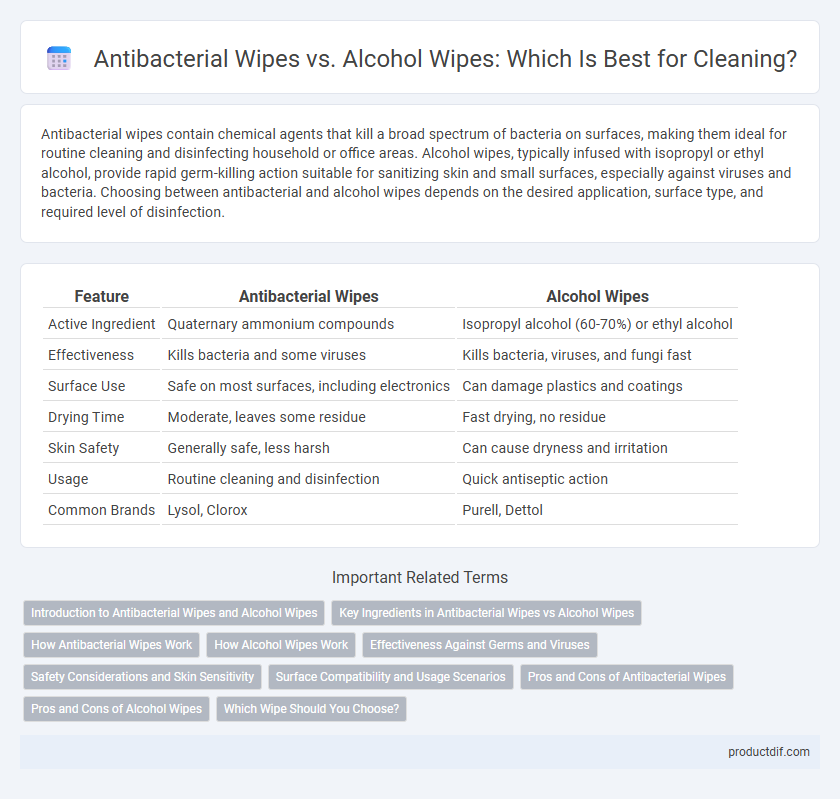Antibacterial wipes contain chemical agents that kill a broad spectrum of bacteria on surfaces, making them ideal for routine cleaning and disinfecting household or office areas. Alcohol wipes, typically infused with isopropyl or ethyl alcohol, provide rapid germ-killing action suitable for sanitizing skin and small surfaces, especially against viruses and bacteria. Choosing between antibacterial and alcohol wipes depends on the desired application, surface type, and required level of disinfection.
Table of Comparison
| Feature | Antibacterial Wipes | Alcohol Wipes |
|---|---|---|
| Active Ingredient | Quaternary ammonium compounds | Isopropyl alcohol (60-70%) or ethyl alcohol |
| Effectiveness | Kills bacteria and some viruses | Kills bacteria, viruses, and fungi fast |
| Surface Use | Safe on most surfaces, including electronics | Can damage plastics and coatings |
| Drying Time | Moderate, leaves some residue | Fast drying, no residue |
| Skin Safety | Generally safe, less harsh | Can cause dryness and irritation |
| Usage | Routine cleaning and disinfection | Quick antiseptic action |
| Common Brands | Lysol, Clorox | Purell, Dettol |
Introduction to Antibacterial Wipes and Alcohol Wipes
Antibacterial wipes contain chemical agents like benzalkonium chloride that target and kill bacteria on surfaces, making them ideal for reducing microbial contamination. Alcohol wipes typically use isopropyl or ethyl alcohol at concentrations of 60-90%, providing rapid disinfection by denaturing proteins and effectively eliminating a broad spectrum of bacteria and viruses. Both products serve as convenient, disposable options for maintaining hygiene, but their active ingredients and effectiveness against different pathogens vary significantly.
Key Ingredients in Antibacterial Wipes vs Alcohol Wipes
Antibacterial wipes typically contain ingredients such as benzalkonium chloride or chlorhexidine, which target and inhibit bacterial cell membranes to reduce microbial presence. Alcohol wipes primarily rely on isopropyl or ethyl alcohol, usually in concentrations ranging from 60% to 90%, to denature proteins and disrupt bacterial and viral cells effectively. Understanding these key ingredients helps in selecting the appropriate wipe for specific cleaning and disinfection needs.
How Antibacterial Wipes Work
Antibacterial wipes contain disinfecting agents like benzalkonium chloride that target and destroy bacteria by disrupting their cell membranes. These wipes effectively reduce microbial presence on surfaces, providing a quick and convenient cleaning solution. Unlike alcohol wipes, which rely on alcohol content to denature proteins and kill a broad range of pathogens, antibacterial wipes focus specifically on bacteria elimination.
How Alcohol Wipes Work
Alcohol wipes work by disrupting the lipid membranes of bacteria and viruses, effectively killing or inactivating these pathogens on surfaces. Their high alcohol content, typically between 60% and 90%, denatures proteins and dissolves lipids, leading to rapid microbial eradication. These wipes are ideal for disinfecting skin and non-porous surfaces, providing quick and effective germ control.
Effectiveness Against Germs and Viruses
Antibacterial wipes contain chemical agents like benzalkonium chloride that specifically target and eliminate bacteria, making them highly effective for general germ removal on surfaces. Alcohol wipes, typically composed of 60-70% isopropyl or ethyl alcohol, rapidly denature proteins and disrupt lipid membranes, providing superior efficacy against a broad range of viruses, including enveloped viruses like coronaviruses and influenza. Choosing alcohol wipes offers enhanced virucidal action, while antibacterial wipes excel in targeting bacterial contaminants.
Safety Considerations and Skin Sensitivity
Antibacterial wipes typically contain chemical agents like benzalkonium chloride, which are effective against bacteria but may cause skin irritation or allergic reactions in sensitive individuals. Alcohol wipes use isopropyl or ethyl alcohol, providing rapid disinfection but can lead to dryness, redness, or cracking, especially with frequent use on delicate skin. Choosing between antibacterial and alcohol wipes requires evaluating individual skin tolerance and the intended cleaning surface to minimize adverse effects.
Surface Compatibility and Usage Scenarios
Antibacterial wipes often contain gentle cleaning agents suitable for a wide range of surfaces, including plastics, glass, and sealed wood, making them ideal for everyday household use on counters and electronics. Alcohol wipes, typically composed of isopropyl alcohol, excel in disinfecting non-porous surfaces like metal and hard plastics but may damage sensitive materials such as coated screens or varnished wood. Choosing between antibacterial and alcohol wipes depends on the surface sensitivity and the required level of disinfection, with antibacterial wipes favored for delicate surfaces and alcohol wipes preferred for medical or high-risk environments.
Pros and Cons of Antibacterial Wipes
Antibacterial wipes offer the advantage of killing a broad spectrum of bacteria and are often infused with moisturizing agents, making them gentler on the skin compared to alcohol wipes. However, they may be less effective against viruses and require thorough rinsing in food-contact areas due to potential chemical residues. Their convenience and antibacterial properties make them ideal for everyday surface cleaning, but alcohol wipes remain superior for rapid disinfection and viral elimination.
Pros and Cons of Alcohol Wipes
Alcohol wipes offer rapid and effective disinfection by killing a broad spectrum of bacteria and viruses within seconds. They evaporate quickly without leaving residue, making them ideal for cleaning electronic devices and medical instruments. However, frequent use can cause skin dryness or irritation and may degrade some surfaces due to the harshness of alcohol.
Which Wipe Should You Choose?
Antibacterial wipes contain disinfectants like benzalkonium chloride effective against a broad spectrum of bacteria, making them ideal for surfaces prone to bacterial contamination. Alcohol wipes, typically composed of 70% isopropyl or ethyl alcohol, offer fast-acting sterilization against viruses and bacteria, preferred for sterilizing medical instruments and skin. Choosing between antibacterial and alcohol wipes depends on the target pathogens and surface type, with antibacterial wipes better for routine surface cleaning and alcohol wipes suited for high-level disinfection.
Antibacterial Wipes vs Alcohol Wipes Infographic

 productdif.com
productdif.com